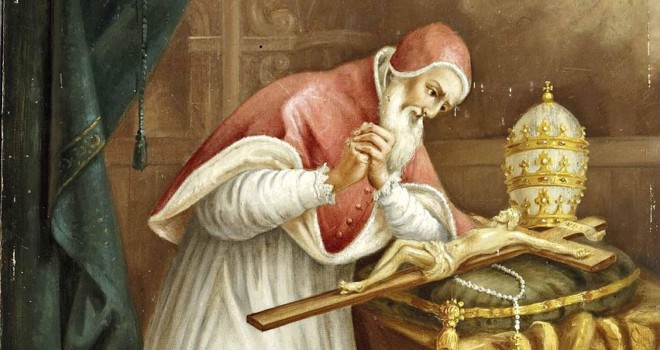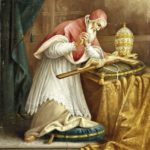Pope St. Pius V
St. Pius V (1504-1572) was the pope entrusted with enforcing the decrees and reforms of the Council of Trent. Born in Italy as Michael Ghislieri, he came from a humble background, and as a youth entered the Dominican Order. Michael developed a reputation as a preacher and teacher; in 1556 he was appointed a bishop, […]



St. Pius V (1504-1572) was the pope entrusted with enforcing the decrees and reforms of the Council of Trent. Born in Italy as Michael Ghislieri, he came from a humble background, and as a youth entered the Dominican Order. Michael developed a reputation as a preacher and teacher; in 1556 he was appointed a bishop, and the following year, a cardinal.
Cardinal Ghislieri strongly supported the reforms of the Church enacted by the Council of Trent (1545-1563), and in 1566 he was elected pope (with the help of the reform-minded Cardinal St. Charles Borromeo). During his six-year reign, Pius ordered the establishment of seminaries for the training of priests, published a new missal (which remained in use for 400 years), and set up Confraternity of Christian Doctrine classes (CCD) for the young. Pius sought, sometimes unsuccessfully, to uphold the Church’s political authority against various European nations. Queen Elizabeth’s interference with Church affairs in England led to her excommunication by Pius; the pope also struggled against the ambitions of the Holy Roman Emperor and King Philip II of Spain.
Pius’ greatest secular triumph was his sponsorship of the European fleet which defeated the Turkish navy in the Battle of Lepanto in 1571, thus saving Europe from a Turkish invasion. Pius was unswerving in his efforts to improve the Church. Many people criticized his methods, but he had the respect of the Roman people, for he established hospitals to care for the sick and distributed food to the poor. In his own personal life Pius remained true to his Dominican origins; unlike some of his predecessors, he lived very simply and devoted much time to prayer.
Lessons
1. Because of human sinfulness, the Church is always in need of reform — just as are individual Christians. St. Pius responded by implementing Trent’s decrees and by promoting solid religious education.
2. Even saints acting in a just cause aren’t guaranteed worldly or political success; some of Pius’ efforts failed (as when his excommunication of Elizabeth I resulted in a persecution of English Catholics). However, in the words of Mother Teresa of Calcutta, “God calls us not to be successful, but to be faithful.”
From Johnnette Benkovic’s Graceful Living: Meditations to Help You Grow Closer to God Day by Day

O Lord, increase my sufferings and my patience.
— Dying words of St. Pius V
Do I have the courage to pray this prayer? Why or why not? What virtue do I most need to acquire to do so?
Other Saints We Remember Today
St. Catherine of Siena (1380), Virgin, Doctor, Patroness of Italy and fire prevention
image: August Kraus (1849–1926), Public domain, via Wikimedia Commons














